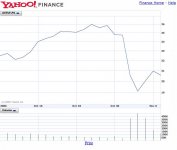I'm not sure how many of you guys (and ladies) invest in the stock market, but yesterday the US markets plunged. Today they are sliding again. Take a look to your the north and blame Canada for this. 
After bringing in billions upon billions of dollars into the capital markets and the economy of Canada, the government--led by the Canadian Finance Minister Jim Flaherty--is wreaking havoc on investments.
It’s like inviting folks to a pot luck dinner only to have us drop off our dishes and then show us the door. Canada established some tax laws that made it very favorable for foreigners to invest in Canadian trusts. I have 3 of them in my portfolio. We did the work, brought our capital that helped turn around the Canadian economy and then, just as the government has gotten what it wants, we get screwed. Many of the people hurt by this are retirees who invested in the Canadian trusts.
Only a couple of weeks ago, Jim Flaherty rolled out his compliments to the trust market for bringing so much to the Canadian economy as well as helping capitalize the resource, energy, consumer, industrial, real estate and utility segments of the nation. After this speech that was well received by investors in- and outside Canada, I became even more optimistic that the Tory-led government was going to continue to keep the trust market and work on reforming some of the ill-fated tax and accounting changes implemented by the Liberals just before their ouster in the last general election. So I bought more shares in another Canadian trust.
The new Canadian Tax Fairness Plan goes like this:
In case you’d like to vent, contact Dan Miles, the Director of Communications Office of the Minister of Finance, at 613-996-7861 or his assistant David Gamble at 613-996-8080.
If you have a broker handle your investments you might want to see if you are invested in any of these money losers. I invest directly so I know how much I've lost
Thanks CANADA

After bringing in billions upon billions of dollars into the capital markets and the economy of Canada, the government--led by the Canadian Finance Minister Jim Flaherty--is wreaking havoc on investments.
It’s like inviting folks to a pot luck dinner only to have us drop off our dishes and then show us the door. Canada established some tax laws that made it very favorable for foreigners to invest in Canadian trusts. I have 3 of them in my portfolio. We did the work, brought our capital that helped turn around the Canadian economy and then, just as the government has gotten what it wants, we get screwed. Many of the people hurt by this are retirees who invested in the Canadian trusts.
Only a couple of weeks ago, Jim Flaherty rolled out his compliments to the trust market for bringing so much to the Canadian economy as well as helping capitalize the resource, energy, consumer, industrial, real estate and utility segments of the nation. After this speech that was well received by investors in- and outside Canada, I became even more optimistic that the Tory-led government was going to continue to keep the trust market and work on reforming some of the ill-fated tax and accounting changes implemented by the Liberals just before their ouster in the last general election. So I bought more shares in another Canadian trust.
The new Canadian Tax Fairness Plan goes like this:
- First, there will be a Distribution Tax on dividend distributions from publicly traded income trusts and limited partnerships. This means that trusts are taxed on the dividend flows, which creates the disincentive to payout bigger dividends.
- Second, there will be a reduction in the general corporate income tax rate of a half percentage point as of Jan. 1, 2011. Gee, thanks. This means that the effective tax rate that trusts have to pay on distributions will start at 34 percent, to mirror federal and provincial taxes on companies, and will drop to 31.5 per cent by 2011.
- Third, there will be an increase in the Age Credit Amount by CD1,000 from CD4,066 to CD5,066 effective Jan. 1, 2007. This will somehow ease the pain of pensioners in Canada who just had their retirement account whacked. And for those of us outside the nation, nothing.
- Fourth, overall, the cut in corporate tax rates by that massive half of one percent, along with the credits and some accounting easements for the elderly in Canada, are meant to reduce taxes by around a billion Canadian dollars annually for Canadian taxpayers. The plan itself erased tens of billions of dollars from the investment and retirement savings of Canadian taxpayers.
- Last, for income trusts that begin trading after this week, the plan measures will apply beginning with their 2007 taxation year. For existing income trusts and limited partnerships, the government is proposing a four-year transition period. They won’t be subject to the new measures until their 2011 taxation year. However, the markets won’t wait--investors and traders discount everything, so not only have all the Canadian trusts tanked, the world markets are going down too.
In case you’d like to vent, contact Dan Miles, the Director of Communications Office of the Minister of Finance, at 613-996-7861 or his assistant David Gamble at 613-996-8080.
If you have a broker handle your investments you might want to see if you are invested in any of these money losers. I invest directly so I know how much I've lost
Thanks CANADA














